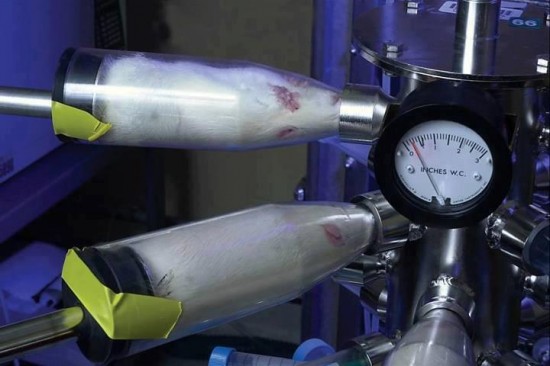BAN CIGARETTE TESTS ON ANIMALS!
Health officials have known for decades that smoking cigarettes causes disease in nearly every organ of the human body and that animal tests are poor predictors of these effects. Yet tobacco companies and the contract laboratories that they hire continue to conduct cruel, irrelevant animal tests on new and existing products.
Torturous Tests:
In tests that many people don’t realize are still being conducted, animals are forced to breathe cigarette smoke for up to six hours straight, every day, for as long as three years. Animals naturally avoid breathing cigarette smoke, so lab rats are forced into tiny canisters, and cigarette smoke is pumped directly into their noses. In the past, dogs and monkeys have had tubes attached to holes in their necks or have had masks strapped to their faces to force smoke into their lungs. In other commonly conducted tests, mice and rats have cigarette tar applied directly to their bare skin to induce the growth of skin tumors.
Specific examples of cigarette experiments include the following:
• In a study to test the effects of adding ingredients such as honey, sugar, molasses, plum juice, lime oil, chocolate, cocoa, and coffee extract to cigarettes, experimenters with Philip Morris stuffed thousands of rats into tiny canisters that pumped tobacco smoke directly into their noses six hours a day for 90 consecutive days. The rats were then killed and dissected to examine the harm caused to their bodies.
• To test the effects of using high-fructose corn syrup to flavor cigarettes, experimenters at R.J. Reynolds spread cigarette tar on the skin of more than 1,000 mice and rats and then forced them to breathe cigarette smoke. Many of the mice who had tar spread on their skin died during the study. Other mice had their skin peel off, and they developed skin tumors. All the surviving animals were killed and dissected.
• Philip Morris experimenters subjected 1,000 rats to two years of breathing either diesel engine exhaust or secondhand cigarette smoke for six hours a day, seven days a week, just to compare the effects of the exposure on their lungs.
• Experimenters hired by Lorillard Tobacco (the maker of Newport and other brands of cigarettes) forced rats to breathe cigarette smoke for three hours a day for five days and then killed them and cut them open to see if the exposure had harmed their lungs.
Companies also conduct animal experiments to test new cigarette papers, tobacco mixtures, and so-called “safer” cigarettes. PETA researchers discovered that until recently, the National Cancer Institute—which is supposed to combat tobacco use—was selling mice to tobacco companies for use in tests to develop new products.(5) And under the guise of developing treatments to “help” smokers, experimenters torture animals with taxpayers’ money. At the Oregon National Primate Research Center, for instance, dozens of pregnant rhesus monkeys had tubes surgically implanted in order to subject them to a continuous flow of nicotine for the last four months of their pregnancies. A few days before full term, experimenters cut the fetuses out of the mothers and killed and dissected the preterm babies in order to determine the effects of nicotine exposure on their bodies.
Archaic Methods:
Tobacco products and their ingredients are not required by U.S. law to be tested on animals—and for good reason. Manufacturers can effectively use in vitro (non-animal) technology, human-based research methods, and the existing body of knowledge from human epidemiological and clinical studies about the health concerns associated with smoking. Indeed, all the tobacco product tests required in Canada are modern non-animal in vitro tests.(7) Tobacco industry scientists have concluded that “in vitro toxicology tests can be successfully used both for better understanding the biological activity of cigarette smoke … and for guiding the development of cigarettes with reduced toxicity.”(8) Philip Morris’ German laboratories have even developed in vitro methods that use human lung tissue to test their products, but the company’s U.S. counterpart still continues to use cruel and less reliable animal tests.
None of the aforementioned cruel animal experiments would even be legal if conducted in Belgium, Estonia, Germany, Slovakia, or the U.K., where tobacco product and ingredient tests on animals have been banned.
Crucial Differences:
Animal tests are not only cruel but also irrelevant to human health. Different animals have different reactions to toxins, and animals in laboratories aren’t exposed to cigarette smoke in the same manner or time frame as human smokers are.
The link between tobacco and lung cancer in humans was obscured for years because data collected from experiments on animals did not show this relationship. A recent article by a tobacco industry consultant reported that results from years of cigarette inhalation studies on rats, mice, hamsters, dogs, and nonhuman primates did not show significant increases in cancerous tumor development and were “clearly at variance with the epidemiological evidence in smokers, and it is difficult to reconcile this major difference between observational studies in humans and controlled laboratory studies now in five different animal species.”
What You Can Do:
To quote the National Cancer Institute, “There is no safe tobacco product.” We already know fromclinical research—and from basic common sense—that smoking is bad for us. If you still use tobacco products, seek out companies such as Imperial Tobacco, Nat Sherman, and Santa Fe Natural Tobacco that have official policies against testing their products on animals.
If the tobacco industry wants to continue developing and marketing products that cause addiction and kill people, it should do so without the help of the government and without harming animals. You can write to the U.S. Food and Drug Administration and request that it follow the lead of agencies in progressive countries by banning tobacco product and ingredient tests on animals:
Tobacco Products Scientific Advisory Committee
Center for Tobacco Products
U.S. Food and Drug Administration
10903 New Hampshire Ave.
Silver Spring, MD 20993
[email protected]
SIGN THE PETITION-PETITION to ask the U.S. Food and Drug Administration (FDA) to take action!
Please sign at the link – Thank you very much!
http://features.peta2.com/
For more related information, please see:
http://
Views: 0
 RSS Feed
RSS Feed

















 April 4th, 2013
April 4th, 2013  FAKE NEWS for the Zionist agenda
FAKE NEWS for the Zionist agenda 
 Posted in
Posted in  Tags:
Tags: 
















